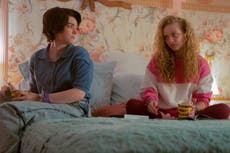The Woman King review: ferocious warrior tale is a vibrant celebration of Black womanhood in all its glory
Viola Davis plays the (fictionalised) leader of the (real-life) Agojie, an elite unit of all-female warriors active in the historical kingdom of Dahomey
Dir: Gina Prince-Bythewood. Starring: Viola Davis, Thuso Mbedu, Lashana Lynch, Sheila Atim, John Boyega. 15, 135 minutes.
Gina Prince-Bythewood is exactly the kind of filmmaker Hollywood needs. Whether in the intimacy of her dramas Love & Basketball (2000) and Beyond the Lights (2014), the propulsion of her comic book adaptation The Old Guard (2020), or, now, the rousing spirit of her historical epic The Woman King, the core strengths of her work remain unaltered, whatever the scale of the project. There is always the same heart, the same integrity, and the same genuine investment in representing the world as it is, even if it puts her at odds with what white Hollywood execs want it to be.
So far, she’s been proven right in her instincts. The Old Guard already has a sequel in the works. The Woman King, which was bounced around studios for three years after being deemed unprofitable, climbed straight to the top of the US box office. Its success should never have been treated as a surprise – this is kinetic, muscular, easy-to-cheer filmmaking applied to a story ready-made for the silver screen. Written by Dana Stevens, based on an idea pitched by Maria Bello to fellow actor Viola Davis at an awards ceremony, it casts the Oscar-winner as Nanisca. She’s the (fictionalised) leader of the (real-life) Agojie, an elite unit of all-female warriors active in the historical kingdom of Dahomey (located in what is now Benin, in West Africa).
Stevens’s script, set in 1823, introduces the Agojie as a transgressive group able to live within their own vision of womanhood. Formally considered “wives” of King Ghezo (John Boyega), unable to marry or have children of their own, their reputation for ferocity remains unparalleled – no one dares gaze upon them as they march through the streets. We learn of the Agojie, and their ways, primarily through the eyes of a newcomer to their ranks, Nawi (Thuso Mbedu). Passed off to them by her father, as supposed punishment for her refusal to take a husband, she’s quickly welcomed in by Nanisca’s officers, Izogie (Lashana Lynch) and Amenza (Sheila Atim).
The Agojie’s battles against their enemies – part of the neighbouring Oyo Empire – bear a ruthless efficiency. A machete carves into an Achilles tendon. Izogie’s nails, filed into sharp talons, scratch at a man’s eyes. A knife, tied to the end of a rope, whistles as it cuts through the air. The militancy of the Agojie has its own cold beauty, but the film equally drinks in the splendour of Gersha Phillips’s costumes and Akin McKenzie’s production design. The camera, at times, may linger on a beautiful set of carved, wooden doors, or the gilded embroidery of King Ghezo’s robes.
The film, contrary to some claims, doesn’t shy away from Dahomey’s role in the European slave trade, and Ghezo is seen trading off captives to the Portuguese in exchange for weapons. Stevens, however, reaches for the same kind of narratively expedient simplification that saw Gladiator’s own fictitious, larger-than-life hero Maximus usher in the restoration of the Roman Republic (a wholesale invention, any historian will tell you). Nanisca is positioned as a moral objector to slavery, who believes Dahomey’s wealth can instead be sustained through the trade of palm oil.
There are a few other concessions here, made primarily to fit the traditional image of what a historical epic should look like, including a wishy-washy, illicit romance between Nawi and a biracial slaver named Malik (Jordan Bolger). But Davis, Mbedu, Lynch, and Atim’s performances are all so unilaterally committed – not only to the hardened quality of these soldiers, but also to their gentility, their sense of humour, their pain, and their resolve – that the film’s emotions are convincing and sincere. The Woman King isn’t intended to be any ordinary account of history. It is a vibrant, restorative celebration of Black womanhood in all its glory.
Join our commenting forum
Join thought-provoking conversations, follow other Independent readers and see their replies
Comments


Bookmark popover
Removed from bookmarks